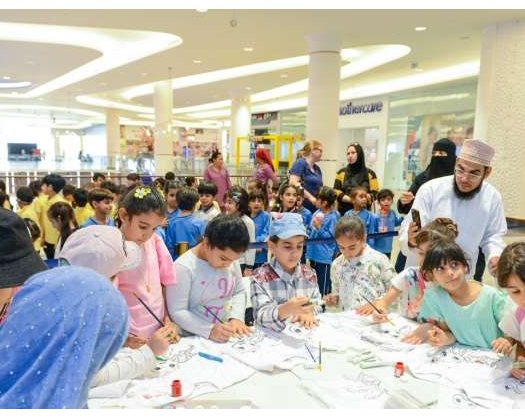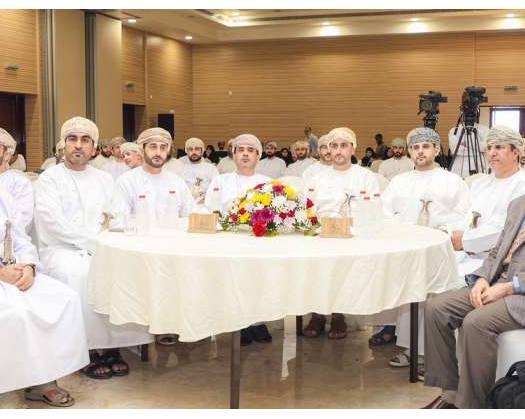Muscat: The Sultanate of Oman is a pioneering country in early childhood development, both in terms of legislation and services. It was one of the first countries to ratify the Convention on the Rights of the Child and took early steps to develop legislation protecting children's rights.
The UNICEF office in Oman underlined that the enactment of the Child Law in 2014 was unequivocal proof of this commitment. This was reinforced by the 2023 School Education Law, which recognized children's right to early education, and the 2023 Social Protection Law, which created an integrated system of social benefits and insurance. These regulations incorporated international best practices for delivering benefits, such as those for children and people with disabilities, and worked to improve them in order to promote protection and investment in childhood development while upholding principles of justice.
Sumaira Chowdhury, UNICEF representative in Oman, emphasized substantial progress in social protection by strengthening national legislation to promote children and families, ensuring that services reach the most disadvantaged populations. This advancement includes the establishment of social safety schemes and stronger intersectoral collaboration to provide a complete response to beneficiaries' demands.
She emphasized that the UNICEF Office plays an important role in promoting national efforts by providing technical assistance and strategic guidance in policy and program development. It also improves national capabilities for data collection and analysis in order to support evidence-based planning. UNICEF, in collaboration with government organizations, strives to improve child protection mechanisms and include them into the social protection framework, resulting in a holistic and sustainable system focused on the well-being of every kid.
In an interview with the Oman News Agency (ONA), she stated that Oman and UNICEF's collaboration is based on a long-term strategic alliance dating back to 1971, with the goal of promoting child rights in a variety of areas, including education, health, protection, nutrition, and early childhood development. Both parties collaborate closely to define national laws and programs that guarantee every child in Oman has their rights fully and equitably, in accordance with the Convention on the Rights of the Child and Oman Vision 2040.
She stated that the collaboration involves a coordinated national program with the appropriate Omani child welfare authorities. This programme is assessed every five years, has annual implementation plans, and includes discussions on national objectives and programmes within UNICEF's framework of assistance for government efforts to improve child wellbeing, she said.
She also emphasized Oman's rising focus on early childhood development, as seen by its incorporation into national objectives and increased expenditure in early care and education initiatives. Oman's emphasis on a child's early years demonstrates her profound awareness of this important stage in laying the groundwork for the child's future talents and abilities, she said.
She also noted: "Oman has made substantial progress in child development, universal immunization, and inclusive education for all children without exception. It continues to demonstrate commitment by providing new solutions such as labor legislation and family-friendly measures that provide parents enough time to care for their children in their early years. These activities help Oman become a worldwide leader in children care and protection.
The UNICEF representative in Oman stated that the country has a complete set of programmes aimed at building children's and adolescents' skills in education, health, and community participation. Today, she said, a qualitative change is apparent in the acceptance of inclusive approaches that meet the needs of a variety of communities, including children with disabilities and individuals at risk. UNICEF promotes these efforts and helps to enhance their influence through technical help and capacity development.
She said that tight coordination with the Ministry of Social Development and other appropriate organizations, like the Ministry of Health and the Ministry of Education, has helped consolidate efforts to study and understand child development pathways and protect children from all sorts of abuse or harm. This institutional collaboration, she noted, entails updating the Child Protection Manual and drafting a study on establishing integrated early childhood institutions to improve coordination mechanisms among stakeholders, so as to ensure enhanced child case monitoring and high-quality, consistent followup.
She stated that national legislation, such as the Child Law and the Child Protection Manual, are significant achievements that place Oman among the countries working to promote children's rights. From an international standpoint, these laws demonstrate Oman's honest resolve to adapt its laws with international conventions and norms, creating a legal framework that promotes child protection and fairness, she said.
She said: "Oman plays an important role in promoting developmental and humanitarian programs for children both domestically and through its engagement in regional and international initiatives. UNICEF feels that Oman can be a powerful voice for children in the region by backing projects that focus on health, education, and child protection, especially during humanitarian catastrophes.
Oman receives worldwide acclaim for its noble positions and fair backing for children and humanitarian issues. Its peaceful and neutral stance makes it a trustworthy and pleasant ally for everyone, especially in light of the ongoing humanitarian catastrophes in the Middle East and North Africa. In this regard, Oman has kindly contributed OMR385,000 ($1 million) to help Gaza's youngsters, as part of its continuing support for UNICEF's worldwide humanitarian and relief operations.
She noted that important aims in preschool education development include creating child-friendly school environments and providing instructors with inclusive teaching skills via the Future Skills Framework.
She stated that partnership with the Ministry of Health focuses on developing skills for early childhood care services, as well as nutrition programs like breastfeeding and mental health assistance. She said that joint efforts with the Ministry of Social Development and the Ministry of Education include a thorough study to find ways to implement the Education Law, which guarantees preschool education as a basic right for all children. UNICEF is looking at ways to assure the deployment of early education services in Oman, as well as conducting research on how to improve early childhood development via integrated service centres.
She emphasized that UNICEF Oman operates programs that enhance the skills of early-grade teachers and social workers, as well as offer ongoing technical assistance to partners in the Ministry of Health and the Ministry of Education to ensure intervention quality and sustainability. There is increasing emphasis on improving rehabilitation and care services for youngsters with disabilities, as well as attempts to construct infrastructure, services, and competent staff, she said, emphasizing the necessity to improve social and educational inclusion and establish early detection and intervention tools.
She highlighted that UNICEF plays a key role in assisting the Omani government in establishing a unified national child protection system based on prevention, monitoring, and early intervention. It also seeks to increase community knowledge, train frontline personnel, and establish standard procedures for responding to violence, abuse, and neglect. The office established a positive parenting training program to teach parents and caregivers about child protection, nutrition, early learning stimulation, and social inclusion.
She also stated that UNICEF, in collaboration with partners, local organizations, and the National Family Affairs Committee, began a national awareness campaign dubbed "Our Children, a Trust," which garnered broad support. The campaign emphasizes the significance of early childhood development and its influence on children's futures.
She stated that UNICEF has also developed and conducted behavior change communication initiatives aimed at child protection, focusing on family and community roles, and addressing new challenges such as cyberbullying, mental health, and violence. These programs, she emphasized, encourage youngsters and adolescents to articulate their concerns and participate in the solution.
She said that UNICEF, in collaboration with government agencies, created a national strategic communication strategy for societal behavior change based on scientific data that addressed practices, habits, and knowledge levels associated with early childhood development. It also conducts focused awareness campaigns to improve social metrics, including as encouraging breastfeeding and adequate nutrition, and building supportive environments for total child development.








